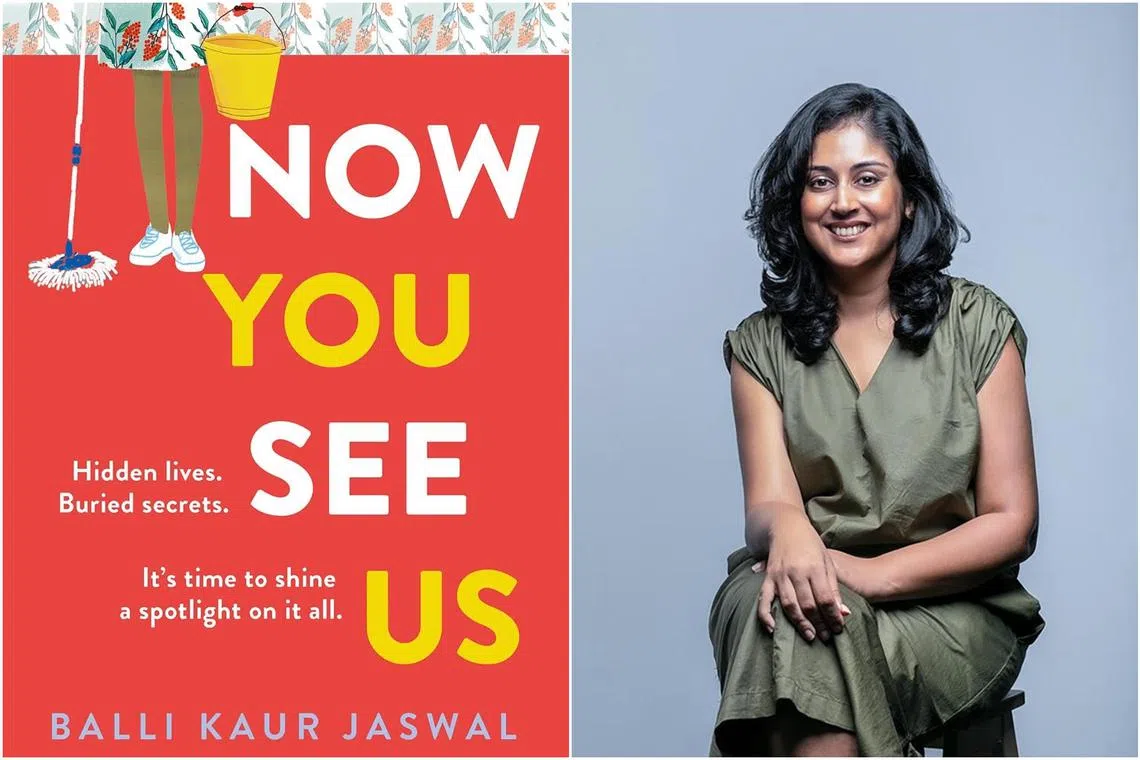Book review: Maids solve murder mystery in Balli Kaur Jaswal’s Now You See Us
Sign up now: Get ST's newsletters delivered to your inbox

Author Balli Kaur Jaswal delivers sharp insights into Singapore society through the eyes of those it classifies as foreign in Now You See Us.
PHOTOS: TIMES DISTRIBUTION, LIN LEI PHOTOGRAPHY
Follow topic:
Now You See Us
By Balli Kaur Jaswal
Fiction/HarperCollins/Paperback/325 pages/$30.24/Books Kinokuniya
4 stars
When a Filipina domestic worker is arrested for her employer’s murder, all Singapore seems to think she is guilty – except for a trio of unlikely sleuths, who set out to find the real culprit and exonerate their countrywoman.
Singaporean author Balli Kaur Jaswal made it big with her juicy London-set novel Erotic Stories For Punjabi Widows (2017).
She has now remixed those ingredients – a tight-knit community of disenfranchised women, a repressive society, a dangerous mystery – closer to home, with even finer results.
Now You See Us, her fifth novel, is a smart, funny read that astutely blends social satire with intricately plotted mystery.
But it is, above all, character-driven, with heroines so vibrant they almost spring off the page.
The oldest, Cora, has returned to domestic work in Singapore after years back home in the Philippines. At the Merry Maids agency, she meets newly arrived Donita, who is already at odds with her difficult employer.
Cora and her old comrade Angel befriend the younger Donita, a social media-savvy rebel who chafes against the restrictions of migrant life in Singapore.
When Donita’s friend Flordeliza is accused of bludgeoning her employer to death – even though Donita saw her elsewhere when the crime took place – the three women start their own investigation, leveraging their near-invisible presences in the homes of Singapore’s elite.
Each of the women has problems of her own. Angel, a lesbian recovering from a bad break-up, has to fend off sexual harassment from her employer’s son.
Donita tries to juggle her dating life with the increasingly tyrannical demands of her employer, Fann Poh Choo, who subjects her to demeaning searches whenever she leaves the house and confiscates her phone.
Cora, once an outspoken activist for domestic workers’ welfare, has returned to Singapore a shadow of her old self, fleeing a mysterious threat related to Filipino President Rodrigo Duterte’s drug war.
In the acknowledgments, Jaswal says that she interviewed a number of domestic workers, many of whom asked not to be named for privacy reasons.
This enables her to pack scenes with vivid details, from the balikbayan boxes that Filipina workers fill with gifts to send home, to the factory where Donita’s agency deploys her illegally to wash mushrooms.
The novel features a spectrum of employers, from the abusive Mrs Fann to Cora’s kindly boss Elizabeth Lee, who is highly solicitous of Cora’s welfare, though the lack of boundaries between them makes Cora uncomfortable.
“I just want to do my job, not go out and share my life with you,” she says. It reflects the uneasy dynamic that exists in many Singapore households, where you share a living space with someone who you might say is part of the family, but who, at the end of the day, is a paid employee.
Jaswal delivers sharp insights into Singapore society through the eyes of those it classifies as foreign.
There are fictionalised references to real-life events, from the 2009 takeover of gender equality group Aware (Association of Women for Action and Research) by a Christian faction; to the case of Flor Contemplacion, a Filipina domestic worker in Singapore who was convicted of murder and sentenced to hang in 1993.
As a whodunnit, Now You See Us delivers twists aplenty and a satisfying ending. As social commentary, it holds up a mirror to Singaporean readers.
It opens their eyes to the invisible world that exists alongside theirs, full of people with their own complicated lives and loves, seeking a space of their own, sharing a city.
If you like this, read: Our Homes, Our Stories, edited by Karien van Ditzhuijzen (Humanitarian Organisation for Migration Economics, 2018, $19 before GST, City Book Room), an anthology of real-life stories from foreign domestic workers in Singapore. Some write of abuse and exploitation, others of love – both for the families they look after and the ones they left behind.


